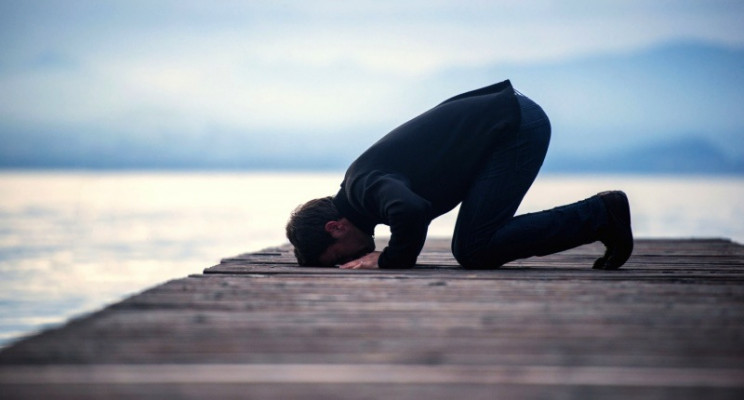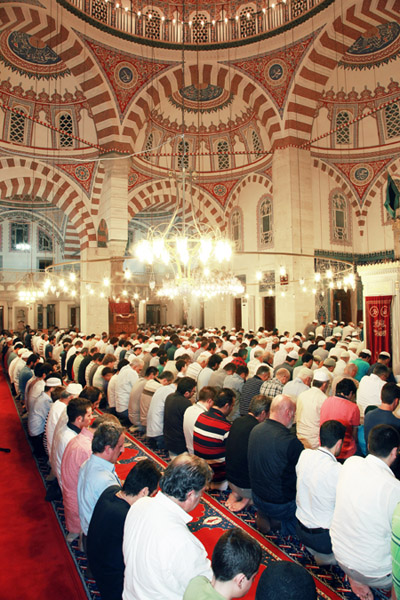Current Section: model

Lesson The Meaning of the Prayer and its Virtue
The Meaning of Salah (Prayer)
The linguistic meaning of salah is supplication. The salah is the connection of the slave with their Lord and Creator, as it encompasses the loftiest meanings of worship and, taking refuge with Allah and seeking assistance from Him. So they supplicate to Him in it and speak to Him privately and remember Him, so their soul is concentrated, and they remember the reality of Him and the reality of the worldly life that they live in and sense the greatness of their Master and His mercy upon them. During it, this salah directs them to uprightness upon the law of Allah and staying away from wrongdoing, obscenity, and disobedience, as He Exalted said (Verily the salah forbids from obscenity and objectionable matters) [Al-Ankaboot: 45]
Salah (prayer) is the greatest of bodily acts of worship and its most noble in affairs. It is an act of worship encompassing the hear, mind, and tongue. The importance of the salah appears in many matters, among them:

1. It is the second pillar of the Pillars of Islam, as (the Prophet) ﷺ said «Islam is built on five: the testimony that there is no deity except Allah and that Muhammad is the Messenger of Allah, establishing the prayer, ...» (Al-Bukhari 8, Muslim 16). The pillar of a structure is the foundation that it relies on and does not stand without it.
2. It is the difference between the Muslims and disbelievers, as the Prophet ﷺ said «Verily, between a man and between polytheism and disbelief is leaving the salah» (Muslim 82). And he said «The covenant that is between us and them is the salah, so who leaves it disbelieves» (At-Tirmidhi 2621, An-Nasa'i 463).

3. That Allah, Mighty and Glorious, commanded maintaining it in all situations: in travel and residence, peace and war, the state of health and of illness. It is performed to the extent of ability, as He Exalted said ﴾Maintain the prayers﴿ [Al-Baqarah: 238] and He described His believing slaves with His statement (and those maintaining their prayers) [Al-Mu'minoon: 9].

Virtues of the Salah
Many evidences have reached (us) about the virtue of the salah from the Book (the Quran) and the Sunnah. From that:
1. That it expiates sins, as the Prophets ﷺ said «The Five Salahs, Jumu'ah to Jumu'ah, Ramadan to Ramadan are expiations for what are between them, if the major sins are avoided» (Muslim 233, At-Tirmidhi 214)
2. That it is an illuminating light for the Muslim in their entire life, calling them to good and distancing them from evil. He Exalted said ﴾Indeed the salah forbids obscenity and what is deplorable) [Al-'Ankaboot: 45]. And (the Prophet) ﷺ said «The salah is light» (Muslim 223).

3. That it is first what the slave is taken into account for on the Day of Resurrection. Then if it is sound and accepted, the remaining deeds are accepted, and if it is rejected, the remaining deeds are rejected, as (the Prophet) ﷺ said «First of what the slave is taken into account by on the Day of Resurrection is the salah. Then, if it was sound, their remaining deeds were sound for them» [Al-Mu'jam Al-Auwsat lit-Tabrani 1859].
The salah is the most relished of moments of the believer, as they privately converse their Lord in it so they find relief, tranquility, and fondness with Allah Exalted and Glorious.
And it is the greatest pleasure of the Prophet ﷺ as he said «And the salah was made the coolness of my eye (i.e. my comfort) (An-Nasa'i 3940)
He ﷺ would say to his mu'adhin, the caller to the salah, Bilal (may Allah be pleased with him) «Oh Bilal, call to the standing for the salah, comfort us with it.» (Abu Dawud 4985).

And the Prophet ﷺ, if a matter made him anxious or busied him, would take refuge in the salah (Abu Dawud 1319).


